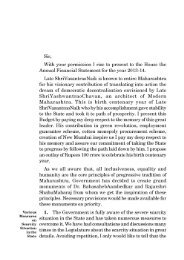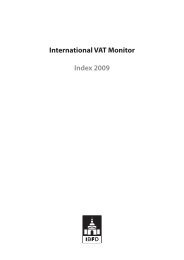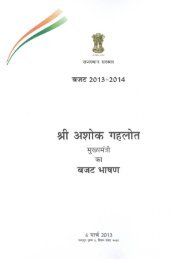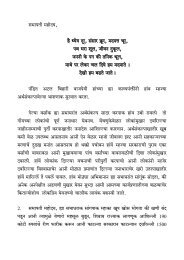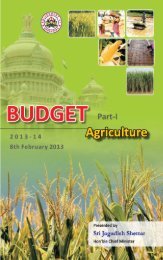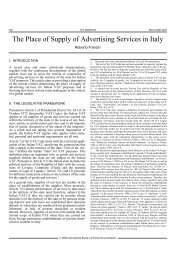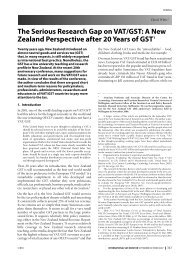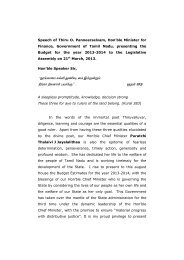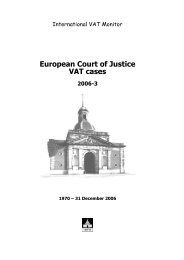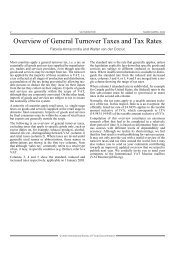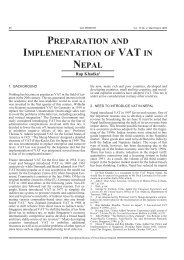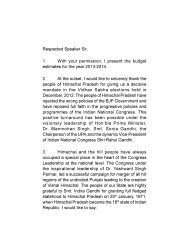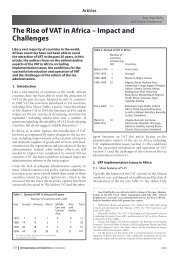ECJ VAT Cases MAY/JUNE 2007 - empcom.gov.in
ECJ VAT Cases MAY/JUNE 2007 - empcom.gov.in
ECJ VAT Cases MAY/JUNE 2007 - empcom.gov.in
Create successful ePaper yourself
Turn your PDF publications into a flip-book with our unique Google optimized e-Paper software.
<strong>ECJ</strong> <strong>VAT</strong> <strong>Cases</strong><br />
<strong>in</strong>g the relevance of the third exemption mentioned<br />
under “legal background”, i.e. the exemption laid down<br />
by Art. 13(A)(1)(k) of the Sixth Directive, she focused on<br />
services “closely related to education”, which are exempt<br />
under the exemption for educational services. 3<br />
One of the basic pr<strong>in</strong>ciples of <strong>VAT</strong> is that all supplies<br />
made by taxable persons are subject to <strong>VAT</strong>, unless the<br />
legislation specifically provides otherwise and, if the<br />
<strong>VAT</strong> legislation provides for an exemption, it must be<br />
<strong>in</strong>terpreted strictly because it is an exception to the rule<br />
that all supplies are subject to <strong>VAT</strong>. Another basic pr<strong>in</strong>ciple<br />
is that, unless the legislation specifically provides<br />
otherwise, <strong>VAT</strong> exemptions and special regimes apply to<br />
certa<strong>in</strong> supplies of goods and services, regardless of the<br />
status of the service provider, for example, the exemption<br />
for <strong>in</strong>surance transactions may apply to supplies<br />
made by an <strong>in</strong>stitution not authorized as an “<strong>in</strong>surance<br />
company”, the exemption for f<strong>in</strong>ancial services may<br />
apply to <strong>in</strong>stitutions other than banks, the marg<strong>in</strong><br />
scheme applicable to the services of travel agents may<br />
apply to hotels, etc.<br />
On the basis of those pr<strong>in</strong>ciples and follow<strong>in</strong>g the Advocate<br />
General’s plausible view that the secondment of<br />
teachers is not the provision of education, the results are<br />
as follows. Horizon College undoubtedly qualified as a<br />
taxable person for <strong>VAT</strong> purposes, which means that, <strong>in</strong><br />
pr<strong>in</strong>ciple, all its supplies were subject to <strong>VAT</strong>. However,<br />
its educational services were exempt from <strong>VAT</strong>. Secondment<br />
of staff however could only be exempt if that<br />
transaction is covered by another exemption.<br />
Under the Sixth Directive, a specific exemption applied<br />
to the secondment of staff. Under Art. 13(A)(1)(k), 4 certa<strong>in</strong><br />
supplies of staff by religious or philosophical <strong>in</strong>stitutions<br />
for the purpose of, <strong>in</strong>ter alia, exempt educational<br />
services and with a view to spiritual welfare, were<br />
exempt from <strong>VAT</strong>. 5 That provision clearly implies that<br />
other supplies (secondment) of staff cannot possibly be<br />
exempt from <strong>VAT</strong>. It is undoubtedly true that the secondment<br />
of staff by Horizon College was made for the<br />
purposes of the educational services provided by the<br />
hir<strong>in</strong>g-<strong>in</strong> <strong>in</strong>stitutions but it cannot reasonably be ma<strong>in</strong>ta<strong>in</strong>ed<br />
that Horizon College was a religious or philosophical<br />
<strong>in</strong>stitution and that the secondment of staff<br />
took place with a view to spiritual welfare. Non-fulfilment<br />
of those conditions should have led to the conclusion<br />
that Horizon College’s secondment of staff was subject<br />
to <strong>VAT</strong>.<br />
Instead of draw<strong>in</strong>g that straightforward conclusion, the<br />
Advocate General exam<strong>in</strong>ed whether or not Horizon<br />
College’s secondment of staff could be exempt on the<br />
ground that it is a supply of goods and services “closely<br />
related” to the educational services rendered by Horizon<br />
College. 6<br />
Subsequently, the Advocate General exam<strong>in</strong>ed the<br />
restrictions applicable to the exemption for educational<br />
services rendered by bodies other than those <strong>gov</strong>erned<br />
by public law. Apart from the optional restrictions to be<br />
set by the <strong>in</strong>dividual Member States7 , those restrictions<br />
are that the exemption for, <strong>in</strong> this case, educational services<br />
and closely related supplies does not apply to private<br />
entities, firstly, where the supply of goods and service is<br />
not essential to the exempt transactions8 and, secondly,<br />
where its basic purpose is to obta<strong>in</strong> additional <strong>in</strong>come9 for the organization by carry<strong>in</strong>g out transactions which<br />
are <strong>in</strong> direct competition with those of commercial<br />
enterprises liable for <strong>VAT</strong>. Although it is obvious that, <strong>in</strong><br />
order to qualify as “closely related”, the supply must be<br />
made by the person who makes the pr<strong>in</strong>cipal exempt<br />
supply and that also the above restrictions must apply to<br />
the “closely related” supplies made by the supplier of the<br />
exempt educational services (Horizon College), the<br />
Advocate General made the remarkable manoeuvre of<br />
<strong>in</strong>terpret<strong>in</strong>g the concept of closely related supplies and<br />
the first restriction as apply<strong>in</strong>g to the transactions carried<br />
out by Horizon College’s customers. 10 In other<br />
words, Horizon College is supposed to determ<strong>in</strong>e<br />
whether or not its supply (secondment of staff) is<br />
exempt from <strong>VAT</strong> on the basis of an assessment of<br />
whether or not that secondment is essential to its customers’<br />
educational services. It is logical that Horizon<br />
College took that view because it had no other plausible<br />
arguments <strong>in</strong> support of its claim that the secondment of<br />
staff was exempt from <strong>VAT</strong> but it is, to say the least,<br />
remarkable that the Commission supported it.<br />
If the new11 policy becomes that taxable persons must<br />
apply exemptions on the basis of criteria that are beyond<br />
their horizon, <strong>VAT</strong> has truly become a highly complex<br />
tax.<br />
3. See note 1, phrase highlighted <strong>in</strong> italics. The “closely related” supplies<br />
<strong>in</strong>clude, for example, provision of educational materials or field trips, for consideration.<br />
4. Art. 132(1)(k) of Directive 2006/112.<br />
5. That exemption cont<strong>in</strong>ues to apply under Art. 132(1)(k) of Directive<br />
2006/112.<br />
6. The expression “thereto” <strong>in</strong> “closely related thereto” clearly refers to the<br />
service provider’s exempt educational services.<br />
7. Those conditions are laid down by Art. 13(A)(2)(a) of the Sixth Directive<br />
(Art. 133 of Directive 2006/112) and <strong>in</strong>clude non-profit-mak<strong>in</strong>g aims,<br />
voluntary management, approved maximum prices, and not result<strong>in</strong>g <strong>in</strong> distortion<br />
of competition.<br />
8. It is highly doubtful that it can reasonably be ma<strong>in</strong>ta<strong>in</strong>ed that the<br />
secondment of teachers by Horizon College was essential to its educational<br />
services.<br />
9. The relationship between that restriction (see Art. 134(b)) and<br />
Art. 13(A)(1)(o) of the Sixth Directive (Art. 132(1)(o) of Directive 2006/112),<br />
which provides for a separate exemption for fund-rais<strong>in</strong>g events organized by<br />
<strong>in</strong>stitutions, <strong>in</strong>clud<strong>in</strong>g educational <strong>in</strong>stitutions whose supplies are covered by<br />
specific exemptions, is not entirely clear.<br />
10. The Advocate General noted that, if students are receiv<strong>in</strong>g education or<br />
vocational tra<strong>in</strong><strong>in</strong>g from an educational <strong>in</strong>stitution, and that <strong>in</strong>stitution suffers<br />
a temporary shortage of qualified teachers or <strong>in</strong>structors, then the benefit<br />
of the education or tra<strong>in</strong><strong>in</strong>g received will be greatly enhanced by the secondment<br />
of qualified staff from another such <strong>in</strong>stitution. It is true that that view is<br />
obviously correct, as a matter of common sense, but it is equally obvious that<br />
the benefit derived by the customer from a certa<strong>in</strong> supply has noth<strong>in</strong>g to do<br />
with the relationship between that supply and the supplier’s other supplies.<br />
11. That policy would not be entirely new because <strong>in</strong> its judgment of 9 February<br />
2006 <strong>in</strong> Sticht<strong>in</strong>g K<strong>in</strong>deropvang Enschede v. Staatssecretaris van F<strong>in</strong>anciën,<br />
Case C-415/04, [2006] ECR I-1385, the <strong>ECJ</strong> followed a similar approach.<br />
Regardless of the results, that l<strong>in</strong>e of reason<strong>in</strong>g should not have been adopted.<br />
224 INTERNATIONAL <strong>VAT</strong> MONITOR <strong>MAY</strong>/<strong>JUNE</strong> <strong>2007</strong> © IBFD



